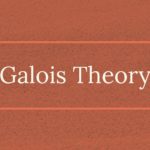Example of an Infinite Algebraic Extension

Problem 499
Find an example of an infinite algebraic extension over the field of rational numbers $\Q$ other than the algebraic closure $\bar{\Q}$ of $\Q$ in $\C$.
Sponsored Links
Contents
Definition (Algebraic Element, Algebraic Extension).
Let $F$ be a field and let $E$ be an extension of $F$.
- The element $\alpha \in E$ is said to be algebraic over $F$ is $\alpha$ is a root of some nonzero polynomial with coefficients in $F$.
- The extension $E/F$ is said to be algebraic if every element of $E$ is algebraic over $F$.
Proof.
Consider the field
\[K=\Q(\sqrt[3]{2}, \sqrt[5]{2}, \dots, \sqrt[2n+1]{2}, \dots).\]
That is, $K$ is the field extension obtained by adjoining all numbers of the form $\sqrt[2n+1]{2}$ for any positive integers $n$.
Note that $\sqrt[2n+1]{2}$ is a root of the monic polynomial $x^{2n+1}-2$, hence $\sqrt[2n+1]{2}$ is algebraic over $\Q$.
By Eisenstein’s criterion with prime $2$, we know that the polynomial $x^{2n+1}-2$ is irreducible over $\Q$.
Thus the extension degree is $[\Q(\sqrt[2n+1]{2}):\Q]=2n+1$.
Since the field $K$ contains the subfield $\Q(\sqrt[2n+1]{2})$, we have
\[2n+1=[\Q(\sqrt[2n+1]{2}):\Q] \leq [K:\Q]\]
for any positive integer $n$.
Therefore, the extension degree of $K$ over $\Q$ is infinite.
Observe that any element $\alpha$ of $K$ belongs to a subfield $\Q(\sqrt[3]{2}, \sqrt[5]{2}, \dots, \sqrt[2n+1]{2})$ for some $n \in \Z$.
Since each number $\sqrt[2k+1]{2}$ is algebraic over $\Q$, we know that this subfield is algebraic, hence $\alpha$ is algebraic.
Thus, the field $K$ is algebraic over $\Q$.
Is $K$ different from $\bar{\Q}$?
It remains to show that $K\neq \bar{\Q}$.
Consider $\sqrt{2}$.
Since $\sqrt{2}$ is a root of $x^2-2$, it is algebraic, hence $\sqrt{2}\in \bar{\Q}$.
We claim that $\sqrt{2}\not \in K$.
Assume on the contrary that $\sqrt{2} \in K$.
Then $\sqrt{2} \in F:=\Q(\sqrt[3]{2}, \sqrt[5]{2}, \dots, \sqrt[2n+1]{2}) \subset K$ for some $n \in \Z$.
Note that the extension degree of this subfield $F$ is odd since each extension degree of $\Q(\sqrt[2k+1]{2})/\Q$ is odd.
Since $\sqrt{2}\in F$, we must have
\begin{align*}
[F:\Q]=[F:\Q(\sqrt{2})][\Q(\sqrt{2}):\Q]=2[F:\Q(\sqrt{2})],
\end{align*}
which is even.
This is a contradiction, and hence $\sqrt{2}\not \in K$.
Thus, $K\neq \bar{\Q}$.
Comment.
With the same argument, we can prove that the field
\[K=\Q(\sqrt[2]{2}, \sqrt[3]{2}, \dots, \sqrt[n]{2}, \dots)\]
is infinite algebraic extension over $\Q$.
However, it is not trivial to show that this field is different from $\bar{\Q}$.
That’s why we used only $\sqrt[2k+1]{2}$ in $K$.
We can also use $\sqrt[p]{2}$ for odd prime $p$.
 Add to solve later
Add to solve later
Sponsored Links
![Equation $x_1^2+\cdots +x_k^2=-1$ Doesn’t Have a Solution in Number Field $\Q(\sqrt[3]{2}e^{2\pi i/3})$](https://yutsumura.com/wp-content/uploads/2017/01/Field-theory-eye-catch-150x150.jpg)












This is really good. Thank you!!
Dear Cauchy,
Thank you for the comment!